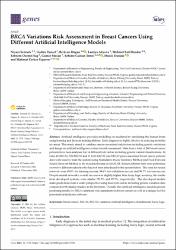| dc.contributor.author | Senturk, Niyazi | |
| dc.contributor.author | Tuncel, Gulten | |
| dc.contributor.author | Dogan, Berkcan | |
| dc.contributor.author | Aliyeva, Lamiya | |
| dc.contributor.author | Dundar, Mehmet Sait | |
| dc.contributor.author | Ozemri Sag, Sebnem | |
| dc.contributor.author | Mocan, Gamze | |
| dc.contributor.author | Temel, Sehime Gulsun | |
| dc.contributor.author | Dundar, Munis | |
| dc.contributor.author | Ergoren, Mahmut Cerkez | |
| dc.date.accessioned | 2022-03-03T08:12:14Z | |
| dc.date.available | 2022-03-03T08:12:14Z | |
| dc.date.issued | 2021 | en_US |
| dc.identifier.issn | 2073-4425 | |
| dc.identifier.other | PubMed ID34828379 | |
| dc.identifier.uri | https //doi.org/10.3390/genes12111774 | |
| dc.identifier.uri | https://hdl.handle.net/20.500.12573/1219 | |
| dc.description.abstract | Artificial intelligence provides modelling on machines by simulating the human brain using learning and decision-making abilities. Early diagnosis is highly effective in reducing mortality in cancer. This study aimed to combine cancer-associated risk factors including genetic variations and design an artificial intelligence system for risk assessment. Data from a total of 268 breast cancer patients have been analysed for 16 different risk factors including genetic variant classifications. In total, 61 BRCA1, 128 BRCA2 and 11 both BRCA1 and BRCA2 genes associated breast cancer patients' data were used to train the system using Mamdani's Fuzzy Inference Method and Feed-Forward Neural Network Method as the model softwares on MATLAB. Sixteen different tests were performed on twelve different subjects who had not been introduced to the system before. The rates for neural network were 99.9% for training success, 99.6% for validation success and 99.7% for test success. Despite neural network's overall success was slightly higher than fuzzy logic accuracy, the results from developed systems were similar (99.9% and 95.5%, respectively). The developed models make predictions from a wider perspective using more risk factors including genetic variation data compared with similar studies in the literature. Overall, this artificial intelligence models present promising results for BRCA variations' risk assessment in breast cancers as well as a unique tool for personalized medicine software. | en_US |
| dc.language.iso | eng | en_US |
| dc.publisher | MDPIST ALBAN-ANLAGE 66, CH-4052 BASEL, SWITZERLAND | en_US |
| dc.relation.isversionof | 10.3390/genes12111774 | en_US |
| dc.rights | info:eu-repo/semantics/openAccess | en_US |
| dc.subject | breast cancer | en_US |
| dc.subject | BRCA1 | en_US |
| dc.subject | BRCA2 | en_US |
| dc.subject | variation | en_US |
| dc.subject | artificial intelligence | en_US |
| dc.subject | translational fuzzy logic | en_US |
| dc.title | BRCA Variations Risk Assessment in Breast Cancers Using Different Artificial Intelligence Models | en_US |
| dc.type | article | en_US |
| dc.contributor.department | AGÜ, Mühendislik Fakültesi, Elektrik - Elektronik Mühendisliği Bölümü | en_US |
| dc.contributor.institutionauthor | Dundar, Mehmet Sait | |
| dc.identifier.volume | Volume 12 Issue 11 | en_US |
| dc.relation.journal | GENES | en_US |
| dc.relation.publicationcategory | Makale - Uluslararası - Editör Denetimli Dergi | en_US |


















